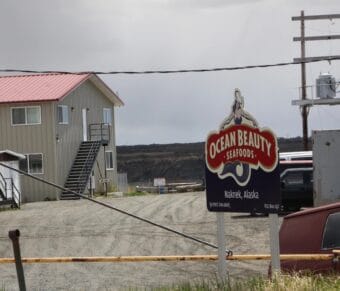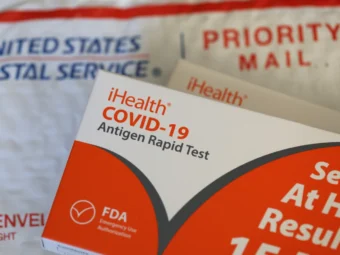Updated Post | 4:14 p.m.
Many of the emergency powers the state was using to respond to the COVID-19 pandemic expired along with the governor’s disaster declaration early Monday morning.
But it’s still not entirely clear exactly what impacts that will have — on everything from vaccine distribution to the suspension of regulations that allowed curbside pickup and delivery of alcohol.
Members of Gov. Mike Dunleavy’s administration gathered Sunday to lay out some of the changes.
“We have no mandates, we have advisories now,” Dunleavy said.
Some things are clear. Alaska residents and non-residents traveling to the state are no longer required by the state to get a pre-travel COVID-19 test or to test on arrival.
“If you wish to get on a plane at the airport without a test, you can do that,” Dunleavy said.
The state does still advise that travelers get tested, and it will still be an option at airports through the end of June.
But that doesn’t mean that people can travel throughout the state freely without being tested. Some cities, such as Juneau, are still requiring travelers to be tested.
Dunleavy said Alaskans should keep an eye on federal rules as well, like the new Centers for Disease Control order mandating masks in all public transport spaces like planes, ferries, buses and taxis.
The administration laid out a COVID-19 transition plan that Dunleavy characterized as moving Alaska toward normalcy.
“We believe we can navigate through this process without a declaration,” he said.
The state issued four new health advisories, some based on health orders the state previously had in place.
In addition to the changes in airport testing, the state is also recommending that people get COVID-19 tests before traveling to locations off the road system and the marine highway system.
Many parts of the state’s COVID-19 response will be impacted by the lapsed disaster declaration. Some 200 regulations that had been suspended will be going back into effect, which will affect everything from telemedicine to curbside alcohol pickup.
“None of that stuff is changing as of today,” Dunleavy said.
Rather, over the next several weeks, commissioners will review those policies and advise his office on what needs to stay in place and what he should allow to lapse.
Another thing that isn’t clear is how the state will continue allocating vaccines.
Director of Public Health Heidi Hedberg said the state’s disaster declaration — and the plan it submitted to the federal government — gave it the legal authority that it needs to distribute vaccines into communities.
Now it’s not clear if the state still has that authority.
“Given this, we feel like we will be able to continue distributing vaccines to Alaskans at least through the end of March,” Hedberg said.
And it’s still unclear how the state will legally distribute vaccines to communities after March. Hedberg also said that the state’s response to community requests may be slower.
Despite the uncertainty, Dunleavy said he believes the worst of the pandemic is behind Alaska.
“This is a new beginning for Alaska, this is a new day for Alaska and we’re optimistic that we can continue to manage this well,” Dunleavy said.
Correction: The declaration expired at 12 a.m. on Monday, not Sunday.
Original story
Gov. Mike Dunleavy is holding a COVID-19 press conference from Juneau at 3 p.m. today.
Dunleavy will be joined by Alaska Department of Health and Social Services Commissioner Adam Crum, Attorney General Treg Taylor, Public Health Director Heidi Hedberg, the state’s Chief Medical Officer Dr. Anne Zink and the Division of Homeland Security & Emergency Management Director Bryan Fisher, according to a Sunday media release.
In previous conferences, they have shared updates on the number of people in the state with confirmed cases, announced public health mandates and explained the administration’s strategy and rationale.
But some parts of the state’s ability to respond to the pandemic have been called into question as the Governor’s disaster declaration expired this weekend after the state House was unable to organize to extend it.
During a Feb. 10 press conference, Dunleavy expressed optimism despite the uncertainty.
“Would a declaration assist us? Yes. If there is no declaration, is it going to throw us into chaos? We don’t know — we don’t think so,” Dunleavy said. “But certainly an extension would help the cause.”
Alaska-specific COVID-19 resources and information are available at coronavirus.alaska.gov.
You can watch today’s press conference live on this post, and on the governor’s Facebook or Livestream pages.



